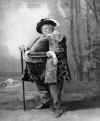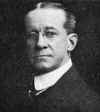











|
|
   |
Robson
& Crane
(1877-1889)

|
|
|
|
|
|
|
-Photo-B&W-Resized%20smaller.jpg)
 |


|
|
(click
on photo to enlarge) |
"His
prodigious comic personality, his
wooden countenance, his staccato
utterance, and his long-familiar
squeak inevitably give an extravagant
turn to the fun." Critic on
his performance of The Meddler |
"Although
Mr. Crane's versatility and his talent
for impersonations are limited, his
comedy powers... are exceptionally
authoritative. His humor, especially,
is broad, unctuous, and perfectly
understandable... there is neither
bite nor sting to the fun that he
invokes. His command of pathos is not
so sure, and he is not always
successful in scenes that require
sustained emotion." From
Lewis C. Strang's Famous Actors
of the Day |
|

|

|
|
Robson,
Stuart [ne Henry Robson Stuart] (1836-1903)
American actor born in Annapolis. As a
boy in Baltimore he did home acting
with the young Booths. He made his
stage debut as Horace Courtney in Uncle
Tomís Cabin as It Is, a dramatic
retort to Uncle Tomís Cabin,
at the Baltimore Museum in 1852, then
under the management of John E. Owens.
The comedian gained his experience in
numerous stock companies. His New York
debut came in 1862 when he joined Laura
Keeneís company. Later he spent
time at Mrs.
Drewís Arch Street Theatre in
Philadelphia and then with William
Warren at the Boston
Museum. He returned to New York in
1871 where he joined the Union
Square Theatre stock company. The
height of his career came when he team
up with W.H.
Crane in Our Boarding in 1877.
The pair became the most popular team
in the theatre, a relationship lasting
12 years. While together they
performed in among other: Our
Bachelors (1878), The
Comedy of Errors (1878) and The
Merry Wives of Windsor, where
Crane played Falstaff and Robson
enacted Slender, Sharps and Flats
(1880), and their biggest success
written especially for them, Bronson
Howardís The
Henrietta (1887). In 1889,
believing that could make more money
separately they broke up. Robson
continued to appear in some of the
plays that had made them famous. In
1893 he performed Tony Lumpkin in a
mounting of She Stoop to Conquer, and
1898 and 1899 he appeared in vehicles
especially written for him The
Meddler and The Gadfly.
Robson last New York appearance was in
Oliver Goldsmith in 1899. At a
time when many clergy regularly railed
at theatre people, Robson was known
among fellow actors for his odd
pastime of maintaining a scrapbook
filled with published accounts of
erring ministers. |
Crane,
W(illiam) H(enry)
(1845-1928) American actor born in
Leicester, MA. He made his debut in
Utica, NY in 1863 as the Notary in The
Daughter of the Regiment with
Harriet Holmanís opera touring
company, in which he remained for
eight seasons. He then played low
comedian roles with Alice Oates Light
Opera. In 1874 he made his New
York debut as Le Blanc the Notary, in
the original production of the musical
burlesque Evangeline
at Niblo's
Garden. Three years later, in
1877, he teamed with Stuart
Robson to produce a series of very
popular domestic comedies. Their
initial success was as the quarreling
neighbors in Our Boarding House
(1877) in which Crane played the role
of Colonel M.T. Elevator, the Corn
Exchange operator. In subsequent
collaborations, Crane appeared as
Dromio of Ephesus in The
Comedy of Errors (1878,
lavishly revived in 1885); As Bachelor
Jowler in Our Bachelors (1878);
as Dullstone Flat in Sharps and
Flats (1880); as Sir Toby Belch in
Twelfth Night (1881); and as
Nicholas Van Alstyne in the team's
biggest success, The
Henrietta (1887). This
magnificent and celebrated partnership
lasted until 1889. Then Crane began a
successful career as a producer-actor
in his own vehicles with the role of
Senator Hannibal Rivers in The
Senator, a part with which he
was associated for the rest of his
career. He was a loyal patron of the
American comic playwrights, though
none of his vehicles was of great
significance until he played the
likable horse-trader David
Harum (1900). In 1896, he
toured as Anthony
Absolute in Joseph Jefferson
"all star" production of
Sheridanís The
Rivals. His last New York play
was The
New Henrietta (1913) with
Douglas Fairbanks in the cast. He was
a thoughtful artist who contributed a
number essays on acting and the
theatre to popular journals of the
day. |
|

|

|
 |
 |
|
in
1860s |
in
1880 |
|

|
|
Comedy
of Errors Poster |
 |

|
 |
| in
A Comedy of Errors (1885) |
Comedy
of Errors ad in the NY Times 9/27/1885
with William Haworth as Bathazar |
in
A Comedy of Errors (1885) |
 |

|
 |
| in
The Henrietta (1888) |
The
Henrietta (1888) |
in
The Henrietta (1888) |
|

|

|
 |
|
in The
Meddler (1898) |
as
Anthony Absolute in The Rivals
(1898) |
in
The Rivals (1898) |
|

|
 |
 |
| as
a young man |
in
David Harem (1900) |
in
The Father & the Boys (1908) |
|
 |
|
|
as
Falstaff in The Merry Wives of
Windsor |
|

|
 |
|
|
in
The Senator (1890) |
in
The Senator Keeps House (1911) |
|

|
 |
 |
|
in
1900 |
in
1911 |
in
The New Henrietta (1913) |
|

|
|
William
Haworth and Robson & Crane |
|
|

|
|
Top
of page |
|
|
|
 |